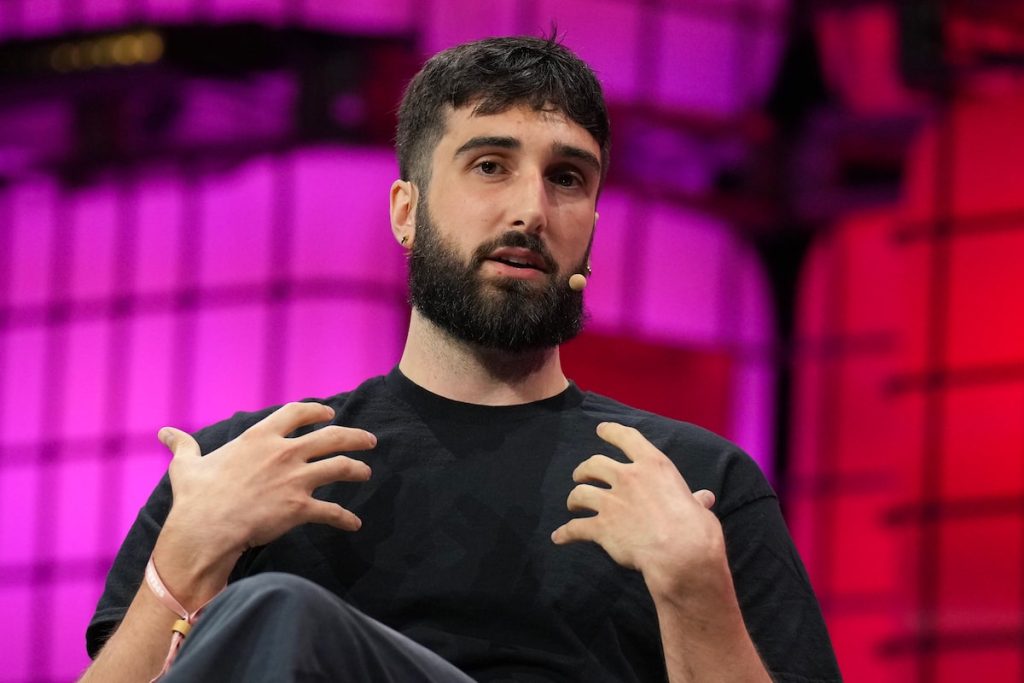Aidan Gomez, co-founder of AI firm Cohere, at the Collision Conference in Toronto in June, 2024. Mr. Gomez says more than 90 per cent of the company’s revenue came from outside Canada as of last year.Chris Young/The Canadian Press
Telecom giant BCE Inc.’s Bell Canada BCE-T and Canadian artificial intelligence company Cohere have partnered to sell AI tools to governments and businesses.
Through the deal, Bell will sell access to Cohere’s large language model software, North, to Bell enterprise and government customers, and host the technology on its data centre infrastructure, providing Canadian companies with an alternative to American cloud computing giants such as Microsoft Corp. MSFT-Q and Amazon Web Services AMZN-Q.
Bell will also use Cohere’s AI technology internally across its employee base to improve productivity and efficiency. “We’re going to go hard and we’re going to go fast,” BCE and Bell chief executive officer Mirko Bibic said on Monday.
For Cohere, the deal with Bell represents another high-profile customer for North, which allows companies to build custom AI agents to help automate workflows. Royal Bank of Canada RY-T signed on in January. Perhaps more importantly, the deal could help Cohere win more domestic customers through Bell.
Cohere’s executives have previously said that Canadian companies have been slow to adopt AI. Cohere co-founder and CEO Aidan Gomez said Monday that, as of last year, more than 90 per cent of the company’s revenue came from outside Canada. That is changing, he said, in part due to an increased attention to Canadian sovereignty.
In the wake of U.S. President Donald Trump’s use of tariffs and economic coercion on Canada and other countries, there is increased concern about relying on American tech companies for crucial digital services such as AI and cloud computing.
Bell and Cohere are both pitching sovereignty as a selling point to customers, including that sensitive data will remain within Canadian borders.
“If there are two equal products, and one is not Canadian and one is Canadian, I think we all want to support our country,” Mr. Gomez said.
Cohere’s annualized revenue has doubled to US$100-million from the start of the year, according to a source familiar with the matter. The Globe and Mail is not identifying the source because they are not authorized to talk publicly.
North has a wide range of applications, Mr. Gomez said, including helping employees review budgets, draft e-mails, and summarize and prepare for meetings.
The partnership will use a revenue-share model, in which Bell will offer the services to customers through its enterprise arm and split the proceeds with Cohere.
As the traditional telecom market has slowed, Bell has doubled down on its AI strategy, part of BCE’s goal to reach $1-billion in revenue from its enterprise business by 2030.
To that end, Bell said in May it is opening six AI data centres in British Columbia. The first one is operational, with another switching online in December or January. Bell has said that the facilities will make up the largest AI computing cluster in the country when completed.
BCE has also merged its technology consulting firms under a new name, Ateko, which will help customers deploy AI tools.
Inside Bell, the company is building a field services management tool using AI to dispatch technicians, and a virtual repair tool to help customers troubleshoot issues. Mr. Bibic added that the company already has AI built into its call centres to coach its representatives in real time.
“There’s still a call centre rep that’s there serving the customer, but it is now so much better because of the AI tool in the background,” he said.
When asked if the use of AI would result in changes to headcount, Mr. Bibic said he saw the technology as “more about combining the power of the technology with the skill and ingenuity” of the company’s employees.
Increasingly, large companies have launched AI customer service options at the same time as they have shed customer service jobs.
The partnership came together in part because of federal AI and Digital Innovation Minister Evan Solomon. Earlier this year, he met with Mr. Bibic and told the CEO to consider working with Canadian companies such as Cohere. “That was a catalyst for me to get more directly involved,” Mr. Bibic said, who added the two companies had already been in discussions.
“Cohere is a really important company for us,” Mr. Solomon said on Monday, adding that only a handful of countries are home to companies that build large language models. While Cohere said in June it has partnered with the Canadian government use AI to improve productivity and efficiency, Mr. Solomon did not identify any specific projects when asked in an interview.
The federal government has given Cohere $240-million through its $2-billion sovereign compute program to help pay for training new AI models. Cohere will spend the funds at a data centre to be operated by U.S. company CoreWeave Inc. CRWV-Q that opens next month in Ontario.

